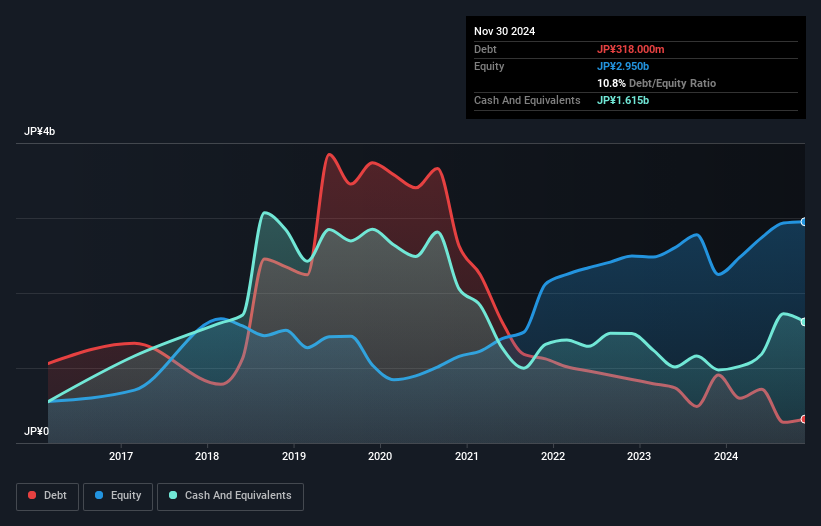
Howard Marks put it nicely when he said that, rather than worrying about share price volatility, 'The possibility of permanent loss is the risk I worry about... and every practical investor I know worries about.' When we think about how risky a company is, we always like to look at its use of debt, since debt overload can lead to ruin. Importantly, Kowa Co.,Ltd. (TSE:7807) does carry debt. But should shareholders be worried about its use of debt?
When Is Debt Dangerous?
Debt and other liabilities become risky for a business when it cannot easily fulfill those obligations, either with free cash flow or by raising capital at an attractive price. Part and parcel of capitalism is the process of 'creative destruction' where failed businesses are mercilessly liquidated by their bankers. While that is not too common, we often do see indebted companies permanently diluting shareholders because lenders force them to raise capital at a distressed price. Of course, debt can be an important tool in businesses, particularly capital heavy businesses. When we think about a company's use of debt, we first look at cash and debt together.
How Much Debt Does KowaLtd Carry?
As you can see below, KowaLtd had JP¥318.0m of debt at November 2024, down from JP¥906.0m a year prior. However, its balance sheet shows it holds JP¥1.62b in cash, so it actually has JP¥1.30b net cash.

A Look At KowaLtd's Liabilities
Zooming in on the latest balance sheet data, we can see that KowaLtd had liabilities of JP¥1.98b due within 12 months and liabilities of JP¥193.0m due beyond that. On the other hand, it had cash of JP¥1.62b and JP¥1.04b worth of receivables due within a year. So it actually has JP¥480.0m more liquid assets than total liabilities.
This short term liquidity is a sign that KowaLtd could probably pay off its debt with ease, as its balance sheet is far from stretched. Succinctly put, KowaLtd boasts net cash, so it's fair to say it does not have a heavy debt load!
View our latest analysis for KowaLtd
On the other hand, KowaLtd saw its EBIT drop by 9.1% in the last twelve months. That sort of decline, if sustained, will obviously make debt harder to handle. When analysing debt levels, the balance sheet is the obvious place to start. But it is KowaLtd's earnings that will influence how the balance sheet holds up in the future. So if you're keen to discover more about its earnings, it might be worth checking out this graph of its long term earnings trend .
Finally, a company can only pay off debt with cold hard cash, not accounting profits. KowaLtd may have net cash on the balance sheet, but it is still interesting to look at how well the business converts its earnings before interest and tax (EBIT) to free cash flow, because that will influence both its need for, and its capacity to manage debt. Over the last three years, KowaLtd recorded free cash flow worth a fulsome 83% of its EBIT, which is stronger than we'd usually expect. That positions it well to pay down debt if desirable to do so.
Summing Up
While we empathize with investors who find debt concerning, you should keep in mind that KowaLtd has net cash of JP¥1.30b, as well as more liquid assets than liabilities. And it impressed us with free cash flow of JP¥859m, being 83% of its EBIT. So we don't think KowaLtd's use of debt is risky. When analysing debt levels, the balance sheet is the obvious place to start. But ultimately, every company can contain risks that exist outside of the balance sheet. For example - KowaLtd has 1 warning sign we think you should be aware of.
When all is said and done, sometimes its easier to focus on companies that don't even need debt. Readers can access a list of growth stocks with zero net debt 100% free, right now.
Valuation is complex, but we're here to simplify it.
Discover if KowaLtd might be undervalued or overvalued with our detailed analysis, featuring fair value estimates, potential risks, dividends, insider trades, and its financial condition.
Access Free AnalysisHave feedback on this article? Concerned about the content? Get in touch with us directly. Alternatively, email editorial-team (at) simplywallst.com.
This article by Simply Wall St is general in nature. We provide commentary based on historical data and analyst forecasts only using an unbiased methodology and our articles are not intended to be financial advice. It does not constitute a recommendation to buy or sell any stock, and does not take account of your objectives, or your financial situation. We aim to bring you long-term focused analysis driven by fundamental data. Note that our analysis may not factor in the latest price-sensitive company announcements or qualitative material. Simply Wall St has no position in any stocks mentioned.
About TSE:7807
KowaLtd
Manufactures and sells nursing care products and welfare equipment under the Tacaof, AURULA, and GENTIL MARRONE brands in Japan.
Flawless balance sheet and good value.
Market Insights
Community Narratives





